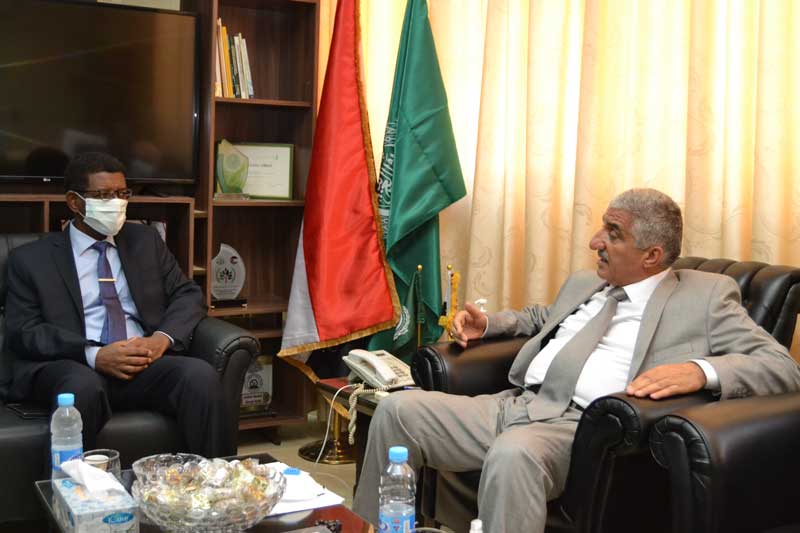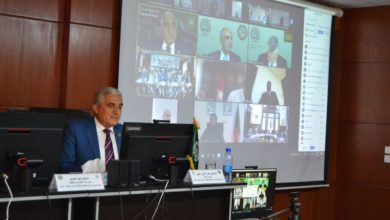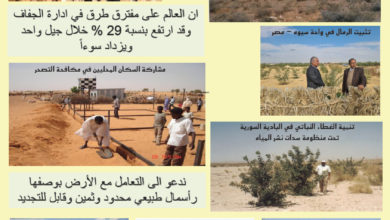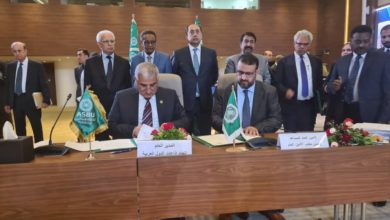Strengthening cooperation between ACSAD and the Republic of Sudan
The Director-General of the Arab Center for the Studies of Arid Zone and Drylands, ACSAD, Dr. Naser Edin Al Obaid discussed with Charge d’Affaires, Embassy of the Republic of Sudan in Damascus, Counselor Tarek Abdullah Ali Mohamed, the cooperation between ACSAD and the Republic of Sudan, and the ways to enhance and develop it in various fields
During the meeting which is held at ACSAD`s headquarters in Damascus on 10/8/2020, the two sides reviewed the agricultural and environmental activities that ACSAD implemented and those are implementing in cooperation with the relevant Sudanese institutions, particularly the project of preparing the map of optimal land-use that aims to develop a scientific framework to guide land-use within the concept of sustainable development, in line with the integrated regional planning sought by Sudan. The director-general explained that the project is being implemented under the umbrella of the cooperation agreement signed between ACSAD and the Ministry of Agriculture and Natural Resources in Sudan according to several phases.
The first phase was implemented between 2006 and 2008 in the states of the Red Sea, Kassala, and Gedaref, with a total of 53 million hectares it has resulted in the preparation of 470 base maps and dedicated maps with various topics and scales, and the preparation of a technical report consists of 12,801280 pages in three volumes and 11 chapters and identifying promising regions for development and investment that are distributed among the following areas( Delta Tucker– Delta Al Qash – Al Butana plain – the Mangrove areas – Khashm el Girba- New Halfa – and the mechanized farming regions). This study constituted a key reference for investment opportunities and the implementation of development projects in various fields, particularly water harvesting and agricultural production projects, with a total value of 3.5 billion US dollars.
The second phase includes the states of Khartoum (North-Nile river), with an area of 50 million hectares. the work was carried out during 2018-2019, and the activities were implemented by a joint working team, with 50 experts from ACSAD and 55 experts and technicians from Sudan. The work resulted in the preparation of a three-part report consist of ten chapters containing 625 maps in 1500 pages, with an executive summary containing information on the current status of natural resources and livestock, identifying obstacles, and submitting proposals to the resource development, guiding its investment and raising their productivity, assessing the current status of pastures and pastoral pathways, identifying the appropriate measures to increase the pastoral load, conducting an integrated study of livestock, and providing special guidelines on the development of production and marketing the animal products; and one of the most important results is the identification of suitable areas for expanding wheat cultivation, which is about 305 million hectares in the current situation, and up to 6 million hectares in the event of reclaiming promising areas and applying the mathematical modeling of groundwater which was implemented by ACSAD.
This phase was characterized by the technical partnership between the two parties, where training courses for Sudanese professionals were held at ACSAD`s headquarters and its scientific research stations in the country of Headquarters, and joint qualitative meetings were organized by distinguished decision-makers and experts from both sides participated. During the course, experiences and knowledge were exchanged, with a reflected positive impact on the overall cooperation and on the results of the project in particular.
Phase III is currently underway by ACSAD, including the states of (Al Jazeera-the White Nile-the Blue Nile) with a total area of 13.2 million hectares). This phase work began in January 2020, with the formation of joint work teams from the Sudan and ACSAD, collecting and analyzing the information, preparing an archive of covered satellite images of targeted states, and preparing the state of knowledge reports for various sectors, design the fieldwork forms, the development of a plan and methodology of action, continuing communication and coordination with the relevant Sudanese institutions to follow up on-field activities in appropriate circumstances.
The fourth phase of the project covers the large state of Kordofan with an area of 37.4 million hectares, which will be implemented immediately after the end of the current phase in which applies the methodologies of the previous phases with making adjustments that suit the nature and natural conditions of the states.
Dr. Al Obaid pointed out that the project results lead to the preparation of investment maps and integrated technical reports that help to identify promising areas for development, attracting capitalization and encouraging investment opportunities, achieving the optimal output and higher productivity per area unit, and supporting decision-makers in implementing national development plans. It makes Sudan the locomotive of Arab food security.
The director-general confirmed that ACSAD is ready to develop cooperation with all the Sudanese institutions in an attempt to maximize it, showing his concern to present the summary of the accumulated scientific experiences by ACSAD in the service of the development process in Sudan.
On his part, Counselor Tarek Abdullah Ali Mohamed, in his name and the name of the employees of the Sudanese embassy in Damascus, congratulated Dr. Naser Eddin Al Obaid on assuming the duties of his new position as the Director-General of ACSAD organization, wishing him every success, promising that the next phase would witness more cooperation and coordination in various fields. He expressed Sudan’s gratitude for the many services that ACSAD organization offers to Sudan, its role in activating development projects, and its importance in pushing agricultural investments; appreciating the Director General’s enthusiasm and willingness to exert all efforts to overcome difficulties to improve the joint Arab work.
At the end of the meeting, Dr. Al-Obaid expressed ACSAD`s readiness to participate in Sudan`s development process and increase the pace of cooperation, wishing the brotherly Sudan progress and prosperity




